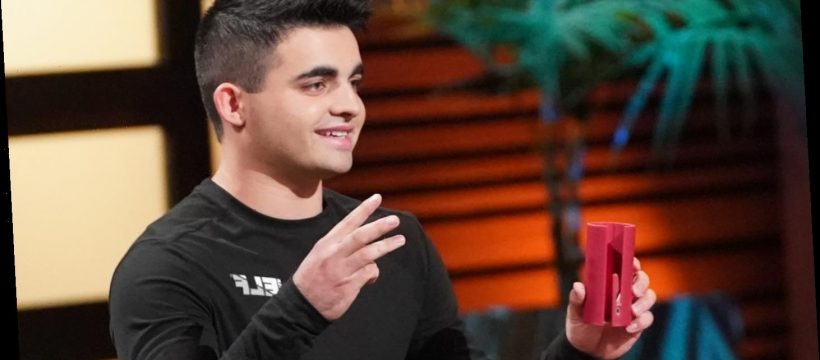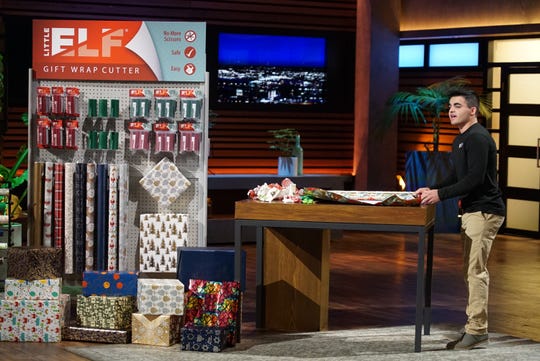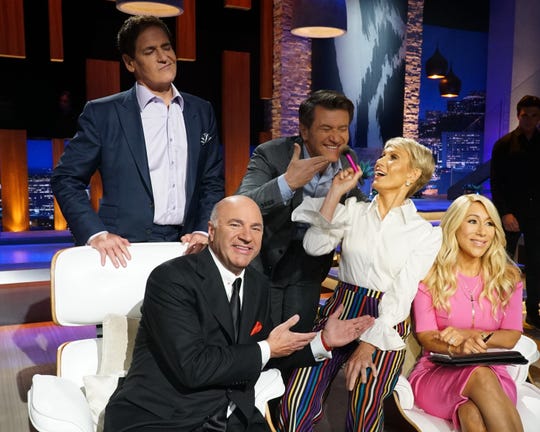Christmas came early on Sunday’s “Shark Tank.” A young entrepreneur tried to revolutionize the hassle of wrapping those gifts under the tree.
Bryan Perla, a junior at Stanford University, is the creator of Little Elf, a device to make cutting wrapping paper a breeze. The product fits around the wrapping paper roll, helping to measure and then create a clean, straight slice.
“We all know the holiday season is stressful,” Perla said. “Do we really need one more thing to test our patience, like cutting wrapping paper with scissors? Everyone hates cutting wrapping paper, because it always comes out ripped, jagged, or crooked.”
Perla got a little help demonstrating his product from sharks Barbara Corcoran and Lori Greiner, who loved how easy it was to use.
Perla developed the idea when he was a senior in high school. Diagnosed with dyslexia when he was in second grade, Perla said he always struggled with reading and school but found a passion for developing ideas. It’s a story Corcoran and shark Kevin O’Leary, who are also dyslexic, could relate to.
Bryan Perla, an entrepreneur from West Boylston, Massachusetts, introduces his innovative tool to make holiday gift-wrapping easier to the sharks on "Shark Tank." (Photo: Eric McCandless, ABC)
Last time: ‘Shark Tank’ recap: Sharks growl over cost of cutting-edge science for man’s best friend
Asking for $150,000 for a 15% stake of the company, Perla was looking for a partner to help with advertising and increasing online sales. He has a licensing agreement with the world’s largest maker of gift wrapping products to sell Little Elf in retail outlets for the next two to four years.
It was a space that Greiner, an expert in QVC online shopping, could help him with: “Listen, I think I’ve heard enough. I’m going to make you an offer. I feel like I would be a great partner for you because this is visual.”
Her offer was $150,000 for 30%. But O’Leary was also interested in Little Elf and had an offer of his own.
“As a fellow dyslexic, I’m going to make you an offer, too,” O’Leary said. “I’m not as greedy. I, too, will bring you in under my vendor code at QVC and my team. I will personally sell it on my show.”
In typical fashion, O’Leary’s offer involved a royalty. He would offer the $150,000 for 10% stake but wanted $1 per sale until he made $450,000. The device retail on the Little Elf website for $7.49.
Perla appreciated the deals but wanted to see what the other sharks had to say: “I think it would be foolish of me not to listen to everybody else.”
Shark Robert Herjavec appreciated Perla’s tenacity and determination, but didn’t feel the product was for him. Likewise, Corcoran didn’t feel Perla needed a shark at all and was doing fine on his own: “I can’t even imagine what you need a shark in.”
Greiner changed her deal to undercut O’Leary: She would offer the $150,000 for a 10% stake, but with a royalty of 75 cents.
Not to be outdone, O’Leary said, “I’ll drop it to 50 cents.”
Sharks Mark Cuban, Kevin O'Leary, Robert Herjavec, Barbara Corcoran and Lori Greiner had some fun getting ready for the holidays on "Shark Tank." (Photo: Eric McCandless, ABC)
With a bidding war underway, Greiner dropped her royalty to 45 cents, followed again by O’Leary to 40 cents, and finally by Greiner to 35 cents.
Perla wasn’t interested in a deal that involved a royalty, though: “I would rather, from my point of view, have partner that’s just equity.”
O’Leary’s new offer was $150,000 for a 25% stake in the company. Greiner sweetened her original deal from 30% to 20%.
“I can sell hundreds of thousands of these in minutes on my show,” Greiner said. “No offense to Kevin, but my show is way more popular.”
The sharks weren’t willing to work together, and O’Leary believed he was worth the extra 5% in value. Perla ultimately decided to partner with Greiner: “Kevin, you’re dyslexic; we have that bond. But Lori is the best option for this.”
Source: Read Full Article


